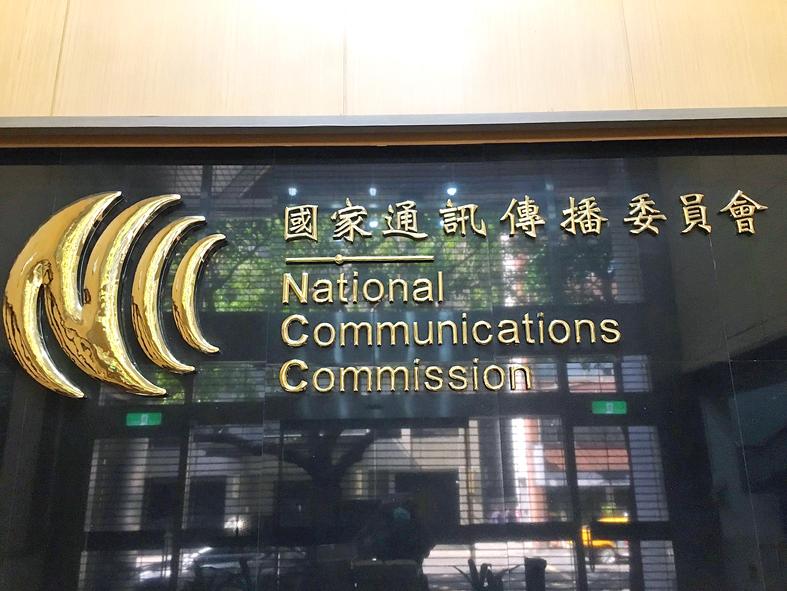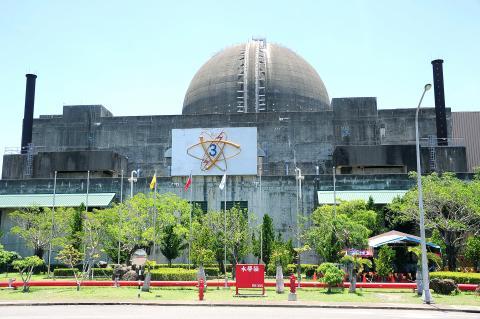The National Communications Commission (NCC) is not pushing a controversial draft digital intermediary service act to the Legislative Yuan, the commission said yesterday, adding that suggested changes to the bill are welcome.
“The draft act has yet to be finalized by NCC commissioners, and has not been delivered to the Executive Yuan or the Legislative Yuan for further review. Therefore, there is no need to withdraw it,” the commission said in a statement.
“Issues related to the Internet are complicated and often come under close scrutiny. The NCC is open to any suggestion from the public,” it added.

Photo: Yang Mien-chieh, Taipei Times
The commission issued the statement following calls from politicians and media experts to drop the draft, which they said could impede online speech freedoms by expanding the government’s authority to flag content.
Some Chinese-language news outlets said the NCC was aggressively pushing the bill regardless of problems identified by civic groups, media experts and industry specialists in three information sessions that the commission has held so far.
The NCC on Friday said it would postpone a public hearing on the draft that was initially scheduled for Thursday, saying “it needs time to thoroughly research, analyze and discuss a variety of issues that were raised at the information sessions.”
“We will resume our communication with the public after making improvements to the draft,” it added.
The draft that it presented to the public on June 29 is a proposal to generate input, the NCC said.
Suggested changes to the draft are to be cautiously assessed, it said, adding it did not push for passage of the first draft of the act, as some have claimed.
“We will continue to listen to opinions from all stakeholders, such as the types of intermediary service providers that should be regulated and how they should be regulated,” it said, adding that postponing Thursday’s public hearing was necessary.
“As an independent agency, we understand that any policy will not be well-rounded and complete without coordination and communication with the Executive Yuan, Legislative Yuan and civil society,” it said.
The draft act was proposed to outline ways to handle problems that have arisen from a rapid development of Internet services, it said.
Cybercrimes — including non-consensual photo sharing, Internet fraud and disinformation — have hurt Taiwanese, particularly women and children, it said.
“We drafted the digital intermediary service act based on the EU’s Digital Services Act. It is our hope that the rights of Internet users can be protected by building an accountability mechanism comprising service providers, the public and the government,” the commission said.
“Freedom of speech is a constitutionally protected right in Taiwan, and its most treasured asset, and we need to carefully tread a fine line between protecting free speech and curbing cybercrimes. Rational discussion among stakeholders is conducive to a feasible policy,” it said.
The commission on Friday also said it would take into account the needs of intermediary service providers who are socially responsible but have problems fulfilling obligations the commission stipulated due to relatively small operating budgets.
Obligations for nonprofit or smaller service providers could be waived or eased, the commission said.

A fugitive in a suspected cosmetic surgery fraud case today returned to Taiwan from Canada, after being wanted for six years. Internet celebrity Su Chen-tuan (蘇陳端), known as Lady Nai Nai (貴婦奈奈), and her former boyfriend, plastic surgeon Paul Huang (黃博健), allegedly defrauded clients and friends of about NT$1 billion (US$30.66 million). Su was put on a wanted list in 2019 when she lived in Toronto, Canada, after failing to respond to subpoenas and arrest warrants from the Taipei District Prosecutors’ Office. Su arrived at Taiwan Taoyuan International Airport at 5am today on an EVA Air flight accompanied by a

An essay competition jointly organized by a local writing society and a publisher affiliated with the Chinese Communist Party (CCP) might have contravened the Act Governing Relations Between the People of the Taiwan Area and the Mainland Area (臺灣地區與大陸地區人民關係條例), the Mainland Affairs Council (MAC) said on Thursday. “In this case, the partner organization is clearly an agency under the CCP’s Fujian Provincial Committee,” MAC Deputy Minister and spokesperson Liang Wen-chieh (梁文傑) said at a news briefing in Taipei. “It also involves bringing Taiwanese students to China with all-expenses-paid arrangements to attend award ceremonies and camps,” Liang said. Those two “characteristics” are typically sufficient

Restarting the No. 2 reactor at the Ma-anshan Nuclear Power Plant would take up to 18 months, Minister of Economic Affairs J.W. Kuo (郭智輝) said today. Kuo was answering questions during a meeting of the Legislative Yuan’s Economics Committee, where legislators are considering amendments to the Renewable Energy Development Act (再生能源發展條) amid concerns about the consequences of the Pingtung County reactor’s decommissioning scheduled for May 17. Its decommissioning is to mark the end of Taiwan’s nuclear power production. However, Chinese Nationalist Party (KMT) lawmakers have proposed an amendment to the Nuclear Reactor Facilities Regulation Act (核子反應器設施管制法) that would extend the life of existing

A magnitude 5.9 earthquake that struck about 33km off the coast of Hualien City was the "main shock" in a series of quakes in the area, with aftershocks expected over the next three days, the Central Weather Administration (CWA) said yesterday. Prior to the magnitude 5.9 quake shaking most of Taiwan at 6:53pm yesterday, six other earthquakes stronger than a magnitude of 4, starting with a magnitude 5.5 quake at 6:09pm, occurred in the area. CWA Seismological Center Director Wu Chien-fu (吳健富) confirmed that the quakes were all part of the same series and that the magnitude 5.5 temblor was